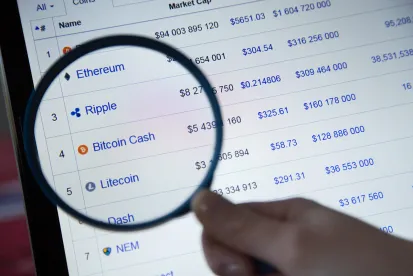On August 1, 2021, the US Senate unveiled the draft text of the Infrastructure Investment and Jobs Act (Bill), a highly anticipated $1 trillion infrastructure package negotiated by the White House and a bipartisan group of senators. As discussed below, the Bill includes a provision (Section 80603) that, if enacted in its current form, would amend the Internal Revenue Code (Code) to extend certain reporting requirements for transactions involving digital assets, including cryptocurrencies such as Bitcoin and Ether and other forms of digital tokens. The provision, which would generally go into effect on January 1, 2023, is intended to address a “tax gap” resulting from the underreporting of cryptocurrency transactions.
BROKER REPORTING
Code Section 6045 generally imposes reporting requirements on “every person doing business as a broker” with respect to sales affected by the broker on behalf of its clients. Under current law, such reporting is currently limited to sales of corporate stock, interests in trusts and partnerships, debt obligations, certain commodities and various associated derivatives. Pursuant to regulations, such sales are reported by the broker on Form 1099-B and the information required to be reported includes identifying information about the taxpayer and the property sold, the sale date and gross proceeds of the sale—and only with respect to the sale of a “covered security,” the adjusted basis of the property sold and the character of the gain or loss on the sale (i.e., long- or short-term capital gain).
For purposes of 1099-B reporting, a “broker” is defined to include a “dealer, a barter exchange, and any other person who (for a consideration) regularly acts as a middleman with respect to property or services.” A typical example of a broker subject to 1099-B reporting is a brokerage firm that facilitates transactions for customers in stocks, bonds and/or commodities.
The Bill expands the definition of a broker to include “any person who (for consideration) is responsible for regularly providing any service effectuating transfers of digital assets on behalf of another person.” Unless otherwise provided by the US Department of the Treasury’s regulations, a “digital asset” means “any digital representation of value which is recorded on a cryptographically secured distributed ledger or any similar technology as specified by [Treasury].” A cryptocurrency exchange would be considered a broker under this language.
The “basis” reporting under Section 6045 only applies to “covered securities.” Under current law, the term covered securities generally includes corporate stock shares, debt obligations, certain designated commodities (and derivatives thereof) and other financial instruments. The Bill would expand the definition of covered securities to include any “digital asset.” Accordingly, brokers subject to Section 6045 will be required to report the adjusted basis and the character of the gain or loss upon the sale of digital assets, including utility tokens, stablecoins and asset-backed tokens.
BROKER-TO-BROKER AND BROKER-TO-NON-BROKER TRANSFER REPORTING
Under current law, Code Section 6045A imposes additional reporting requirements that are generally applicable to the transfer of covered securities by one broker to another. Specifically, the transferor broker must provide a statement setting forth certain information (specified within regulations) about the covered securities transferred so that the transferee broker is able to comply with the 1099-B reporting requirements upon a subsequent sale of the transferred securities. By including digital assets within the definition of covered securities, the Bill imposes this transfer statement reporting requirement on the broker-to-broker transfer of digital assets.
The Bill also expands Section 6045A by imposing an additional reporting requirement when a broker transfers a covered security that is a digital asset to “an account which is not maintained by, or an address not associated with, a person that such broker knows or has reason to know is also a broker” (i.e., a non-broker). In this situation, the transferor must make an information return with the Internal Revenue Service (IRS) containing the same information that would be required in a transfer statement for a broker-to-broker transaction. The Bill provides penalties for failure to comply with the broker-to-non-broker information reporting.
REPORTING OF LARGE “CASH” TRANSACTIONS
Code Section 6050I generally imposes reporting requirements upon any person who is engaged in a trade or business and, in the course of such trade or business, receives more than $10,000 in cash in one transaction or two or more related transactions. These transactions are reported on Form 8300, and the information required includes identifying information about the transferor and the transferee and a description of the transaction.
The Bill expands the definition of “cash” for reporting purposes to include “any digital asset,” such that large transactions in tokens—including cryptocurrency—are required to be reported even outside the brokerage context.
The Senate is expected to amend the Bill over the course of the coming weeks. Particularly, Senator Ron Wyden (D-OR), the chairman of the US Senate Committee on Finance, made a series of posts on Twitter prior to the release of the Bill. In the posts, Senator Wyden expressed concerns that the definition of “broker” lacked clarity and could encompass certain businesses that play an ancillary role in cryptocurrency trading, such as digital wallets and developers of blockchain technologies, and that imposing reporting requirements on such businesses could pose challenges and lead to unintended consequences. On August 3, 2021, Senator Wyden, along with Senators Cynthia Lummis (R-WY) and Patrick Toomey (R-PA), unveiled an amendment to the Bill which generally limits the definition of “broker” to entities with customers, clarifying that cryptocurrency miners, cryptocurrency hardware and software developers and digital asset developers are not intended to fall within the definition.





 />i
/>i
